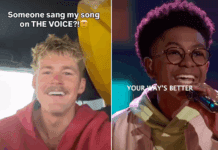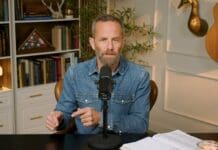To the first question, Acho said he thinks the best approach is to remain calm and to repeat the true reason why the officers are there. To the second, he believes that individual officers need to pursue positive interactions in their communities until there are so many that these good relationships permeate all of society. Throughout all of this, communication is key.
“Communicating with a white cultured person versus a Black cultured person is different,” he said. Acho believes that about 90 percent of Black people have gone through a traumatic experience within the past five months, even if only because of watching the murder of George Floyd. Seeing that video has been different for them than it has been for white people because when Black individuals view that incident, they see themselves as being in Floyd’s situation. Because white people do not envision that scenario happening to them, they are unaware that this trauma even exists for Black people. “You can’t fix a problem you don’t know exists,” said Acho. “I’m letting you know it exists. So now let’s just all work to fix it.”
Black Lives Matter, Blue Lives Matter, and Defunding the Police
Emmanuel Acho asked Nick how he feels when he hears the phrase, “Black lives matter.” Nick answered that Black lives do matter and it is important to recognize the injustices that have happened. But he thinks the Black Lives Matter (BLM) organization has been confusing, especially in the time leading up to the presidential election, because it is not clear whether BLM is more of a movement or a political campaign.
McGovern asked Acho about his perception of the “Blue Lives Matter” flag. Acho responded, “I feel frustrated because I feel as though the agenda is being moved.” He explained, “To say that any life matters is to assert that we thought that [particular] life didn’t matter.” So to say, “Blue lives matter,” implies that historically people have not thought that the lives of police officers have mattered. But the reality is that, historically, that is how people have treated Black lives.
Acho then wanted to know McGreevy’s feelings on the phrase “defund the police.” McGreevy said that the phrase, “’Abolish the police,” upsets him,” but not “defund the police.” He said he has come to realize that “defund the police” has different meanings for different people. If people mean that some of the current responsibilities of police officers need to be handed to others, he has no problem with that.
Glaviano had stronger feelings than McGreevy in response to this question. When he first heard the phrase, “defund the police,” he had a hard time processing it and felt like people were abandoning them. He said, “Prior to May 2020 and George Floyd we were in the midst of a pandemic, we were doing the best we can for our community, people were showing up at the station and bringing us treats. We were heroes. After that, they want to defund us. It hurts.”
Hope for the Future
Several of the officers expressed optimism about moving toward greater understanding with people who are different from them. Glaviano pointed out that even though tragic news tends to make the headlines, many police officers are building bridges in their communities. Out of 60,000 calls their department received last year, they had 2,000 arrests and only 48 of them led to a use of force. “The reality is we’re having a lot of positive interactions with people every day,” he said. McGovern said that as white officers, they would like Black kids to perceive them as teachers and role models who want to help them, not as threats or enemies. “We’re here to help you,” he said, “and I’m sorry that this is currently what you see us as.”
Antonio said he hopes the conversation will help people to see that police officers are human beings and added that he himself has grown in his understanding. When he first saw Colin Kaepernick taking a knee at football games in 2016, he initially saw it as a personal attack. It “felt like a shot to us,” he said. But then as he grew to realize there are some real problems in our country, “It clicked in my mind: That’s not a shot at me. That’s a shot at the system.”
“I wish we could have this conversation with anybody who wants to,” McGovern told Emmanuel Acho. He hopes that the people who see the video “realize that if they want to come talk to us, they can. We can’t be part of the solution if we are part of the problem, so you bringing us on here has at least, you know, opened a door.”














